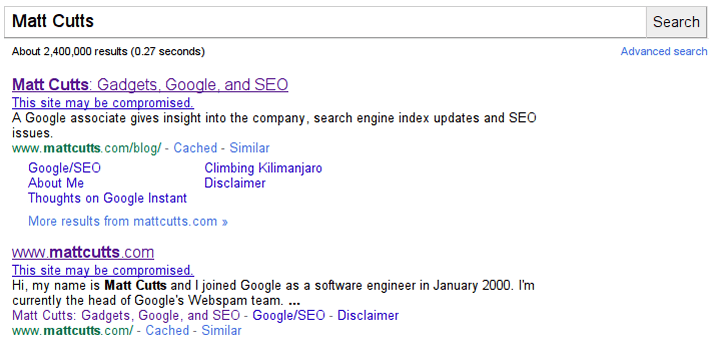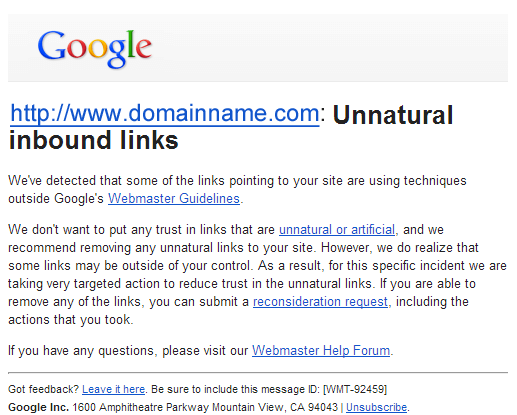Introduction to Google Penalties
Google is continually looking to refine its algorithm and improve search results. As part of this process, Google has rightfully waged a war on spam. As Google seeks to catch the bad guys, companies and websites have increasingly fallen victim and often times a participant in spam and unethical link building practices. As many website owners are trying to recover from a link building debacles it has become paramount they understand what went wrong and how to fix it. This guide is meant to provide a basic outline of how to get out of “Google Jail” and provide in-depth resources and information on how to recover from Google Penalties.
Table of Contents
Chapter 2: The Most Common Penalty
Chapter 3: Filters Vs. Penalties
Chapter 5: The Nasty Google Letter
Chapter 6: This Site May Be Compromised
Chapter 7: Not Appearing In SERPS
Chapter 8: Identifying Bad Links
Chapter 9: Link Removal and Clean Up
Chapter 11: Reconsideration Request
Chapter 13: Will My Rankings Come Back
Chapter 1: What is a Penalty?
A true Google Penalty is a “manual spam action” given to a website because the website owner has violated one of Google’s Webmaster Quality guidelines.
In simple terms, manual spam action = penalty.
A site that has been penalized will be tagged in Google’s search results with a phrase such as “this site may be hacked” or “this site may be compromised”. It will look like one of the images below or the website could be de-indexed and not be found at all. Google will send the webmaster a notice via Google Webmaster tools.


Chapter 2: The Most Common Penalty
The most common manual penalty webmasters receive is an unnatural link penalty or artificial link penalty. The webmaster has most likely participated in some type of link building activity that violates Google’s Webmaster Guidelines. The most likely and common reason someone would be penalized by Google is for paying for links or participating a link scheme. Google identifies link schemes as “Any links intended to manipulate PageRank or a site’s ranking in Google search results may be considered part of a link scheme and a violation of Google’s Webmaster Guidelines. This includes any behavior that manipulates links to your site or outgoing links from your site.”
Link Schemes include:
- Buying or selling links
- Link Exchanges
- Large Scale Article Marketing or Guest Posting with keyword-rich anchor links
- Using automated programs or services to create links (tools like Xrummer)
CHAPTER 3: FILTERS VS. PENALTIES
When people exclaim in fear, “I have been hit by a penalty!” they are usually wrong. In most cases, their website has simply been hit by a Penguin or Panda filter, not an actual penalty.
Filters are essentially updates to the Google Algorithm to help fight spam. If a website no longer meets the algorithm’s standards, it is filtered further down the search results. A website hit by a filter may lose significant rankings, but thankfully filters are relatively easy to recover from if you understand each update’s target and purpose.
A penalty is generally caused when someone is deliberately breaking Google’s Webmaster policies. However, Penguin and Panda filters can lead to penalties as a filter may trigger a manual action, which could then lead to a penalty. The steps to recover from a penalty are drastically different than the steps to recover from a filter.
CHAPTER 4: REAL PENALTIES
Ask yourself the three questions below. If you answer yes to at least 2 of the 3 questions, you’ve officially been penalized.
Did you receive a message through Google Webmaster Tools?
Does your site have a notice in the search results underneath the title that says, “this site may be compromised” or “this site may be hacked”? Note: there are multiple reasons this may appear above your site, one of which is a manual penalty. See Chapter 5.
Has your site disappeared from the search results altogether?
CHAPTER 5: THE NASTY GOOGLE LETTER
If you have received an actual penalty, you will receive a notice in Google Webmaster Tools. The notice will vaguely identify what you have been penalized for, but will not provide specific examples.

CHAPTER 6: THIS SITE MAY BE COMPROMISED
Seeing this phrase associated with your website in the search results can be alarming and at first, it may seem hard to identify what the cause is. However, if you have received a Google Webmaster message, and you have the “this site may be compromised” label under your website in the search results, it is likely you have been hit with a manual penalty.
This issue is two-fold. One, Google believes your website may have possibly been hacked because artificial link building is considered spam to Google. The other issue is your website could have actually be hacked! Often websites using WordPress or Joomla are injected with spammy links, which in turn could trigger a manual penalty.
CHAPTER 7: NOT APPEARING IN THE SERPs
Check if your website is showing up in the search engine result pages (SERPS) by searching your brand name or URL. If your site does not appear, there are two reasons why this is the case.
Your site has not been indexed. If this is the case, it is because your site is new and Google’s spiders have not crawled it yet.
You have de-indexed
If you have been de-indexed from the search results, you have suffered a rough penalty. However, not showing up in the SERPS is very extreme and it is far more likely you just have a warning label accompanying your search snippet.
CHAPTER 8: IDENTIFYING BAD LINKS
So you’ve been hit by a penalty. What’s next? Cleanup. The process to clean up your website can be relatively easy depending on the guidelines you’ve broken. The first step is to identify any and all “bad links”. If you’ve been actively involved in link building for your website, identifying these should be relatively easy. However, if you are unsure of where to start, begin by asking yourself these questions:
Am I paying or renting any links through companies such as TLA, TLB, etc?
Have I used a blog network like Buildmyrank, Ghost Rank, etc?
Have I used an automated link building service like Xrummer?
Has my site been hacked?
Do I have links pointing to my site that are sitewide?
Do I have any sidebar or footer links?
Do I have an unnatural number of exact match anchor text links?
CHAPTER 9: LINK REMOVAL & CLEANUP
If you are paying for links, the fix is simple: cancel and stop paying for them. Things begin to complicate if you have participated in heavy link-building schemes, like Xrumer or a blog network. In fact, if this is the case, you may just want just nuke your site. These types of link manipulation are difficult to remove because you do not have control over the links and the webmasters are often difficult to contact.
CHAPTER 10: DISAVOW
Let’s be clear, I hate the disavow tool. Google requires you to make a valiant effort to remove the links first, by emailing each individual website. They want you to then provide proof that you actually emailed and requested removal. Once you’ve gone through that hassle and it’s failed, you can then make a list of bad links, submit it via the disavow tool, and pray Google removes them. Sounds awful, doesn’t it? Currently, I am unaware if Google notifies the webmaster once the links have been disavowed.
CHAPTER 11: RECONSIDERATION REQUEST
Good news…you are almost done! The last thing to do is write your reconsideration request. When writing it, be honest, specific, and detailed. Google wants to see that you have put forth “good faith” and have sincerely cleaned up your link profile. For example, write to them saying “Previously, I participated in buying links from ______. We have officially canceled all of our links. The following links are examples of ones we have previously rented and have since removed: www.domainone.com, www.domaintwo.com, www.demainthree.com, etc.” If you have used a service to create a mass number of links, openly state the information you know: “Over the past 3 years we have been using Xrumer to create links and have created over 20,202 links. We have since reached out to these sites and asked them to remove our links. For the links that the webmasters we disavowed those links and detailed our responses in the disavow file.” If you have pleaded guilty to Google and been specific, the penalty should be revoked. Again, be SPECIFIC and DETAILED. Doing so is key to removing the penalty. And above all else, go through the effort to actually remove the links. If you don’t, Google will leave the penalty. Don’t try to BS Google, doing so only prolongs the process.
CHAPTER 12: WHAT’S NEXT?
In a few weeks, Google will send you another message in Google Webmaster Tools stating your penalty has been revoked and that it may take some time for their index to be updated. Once the index has been updated, your site will be re-indexed or the “this site may be compromised” message will be removed, depending on the penalty you were given. If the penalty has been revoked and the message is still there, redirect your homepage from www. to no-www. This can speed up the process. Make sure you set the new website with no-www. as the preferred domain in Google Webmaster Tools. Also, ensure your website has not been injected with spam. This may have been the cause for the “this site may be compromised” message to reappear. Once the penalty has been revoked and the preferred domain has been changed, the message should disappear within days.If you have not cleaned up your dirty links you may get a notice after submitting a few reconsideration requests like this:
CHAPTER 13: WILL MY RANKINGS COME BACK?
The answer is yes and no. If you have removed exact match anchor text links, it is unlikely that your rankings will come back for those terms. In large part, these links were the reason you were ranking in the first place. Over time, you can gain these rankings back by building high authoritative links. However, it won’t happen overnight. For terms you were ranking for without exact match anchor text links, the rankings will likely come back relatively quickly.


